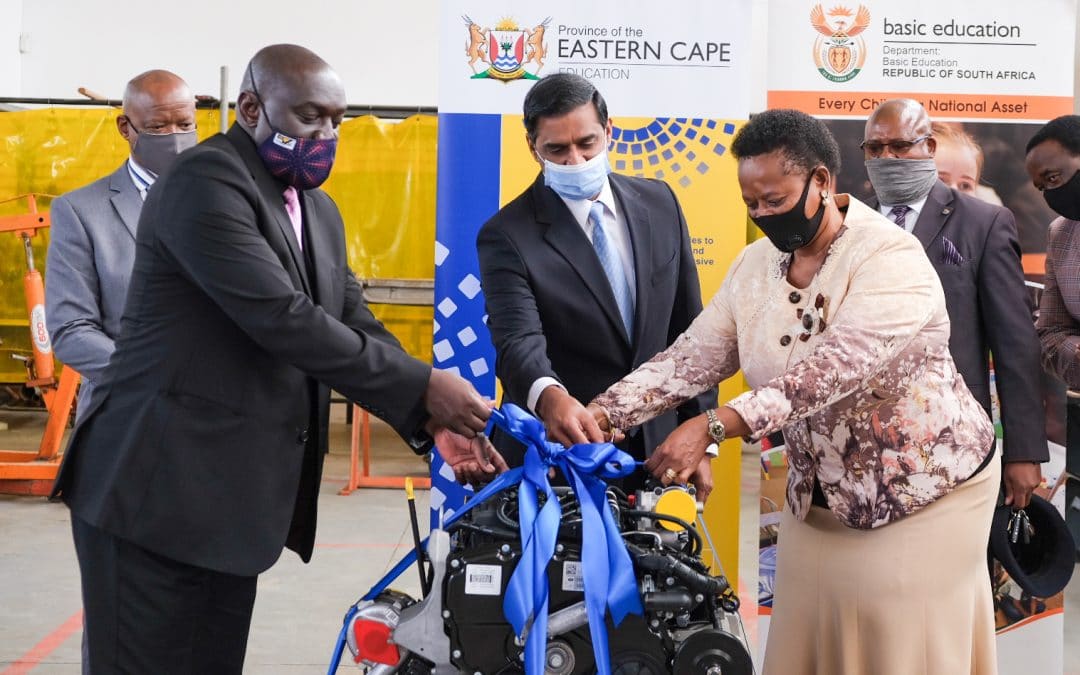Ford Motor Company of Southern Africa (FMCSA) and the Department of Basic Education today handed over the first of 240 engines that are being donated to technical high schools across South Africa.
Kicking off the donation programme, Otto du Plessis High School in Port Elizabeth received the first engine at a media event hosted by Deputy Minister of Basic Education, Dr Reginah Mhaule, and Shawn Govender, Plant Manager of the Ford Struandale Engine Plant.
Valued at R7.8-million, the donated engines will be used to promote youth skills development and training in the automotive industry.
“It is only through sustainable partnerships set in the premise of skills development, training and youth empowerment that we can truly seek to add value to the lives of our future leaders,” Deputy Minister Mhaule said at the handover event. “These engines will go a long way in solidifying the Department’s Three-Stream Model and truly enhance the teaching of Mechanical Technology (Automotive). For this we are truly indebted to Ford Motor Company of Southern Africa.’’
The engines are assembled at the Struandale Engine Plant in Port Elizabeth, which currently operates two engine programmes: the new-generation 2.0 Bi-Turbo and 2.0 Single Turbo engine family, as well as the established 2.2 and 3.2-litre Duratorq TDCi units. These engines are produced for the domestic market and export customers around the world, and are used in a variety of models including the Ford Ranger pickup, the Ranger Raptor high-performance off-road pickup, the Everest seven-seater sport utility vehicle (SUV), as well as the European-built Ford Transit.
“We are exceptionally proud to be part of this initiative, which once again confirms Ford’s commitment to empowering and uplifting the youth, and creating a brighter future for the communities in which we operate,” says Plant Manager, Shawn Govender.
“The automotive industry is one of the largest employers in the country, and Ford alone contributes over 1-percent to South Africa’s total GDP. The industry also plays a key role in the economies of the Eastern Cape and Nelson Mandela Bay in particular, so it’s fitting that we are able to deliver the first engine today to Otto du Plessis High School, which is located very close to our Struandale Engine Plant where the engines are produced.
“We are confident that giving learners at the school level access to our world-class engines will foster new interest in automotive technology, and will inspire the next generation of engineers, designers and technicians who will lead future development and innovation in this sector,” Govender states.
Investing in the future of South Africa
Ford Motor Company of Southern Africa is proud to be one of the country’s largest vehicle manufacturers and exporters with the exceptional Ranger, Ranger Raptor and Everest being produced at its Silverton Assembly Plant in Pretoria. All of the diesel engines used in the locally assembled vehicles are produced at Ford’s Struandale Engine Plant, with fully assembled engines and components also exported around the world. FMCSA currently employs approximately 4 300 people and supports over 50 000 jobs in the total value chain.
Last year Ford launched a ground-breaking public-private partnership with national, provincial and local government in the establishment of the Tshwane Automotive Special Economic Zone (SEZ), adjacent to the Silverton Assembly Plant. This automotive supplier park will help unleash future expansion possibilities for Ford’s operations, and will create thousands of additional jobs within the total value chain, providing a significant economic boost for the local communities.
Ford has various Learnership, Apprenticeship and Experiential Trainee programmes in place to drive skills development across various fields. Over the past five years at the Silverton Assembly Plant, Ford assisted 165 learners gain their NQF qualifications in Automotive Repairs and Maintenance, along with 220 in Autotronics, 765 in Business Administration, 34 in Fitting, 187 in Mechatronics. Additionally, over 1 800 learners attained their National Certificate in Automotive Manufacturing and Assembly.
Over 120 apprentices have completed their training as electricians, fitters, millwrights and motor mechanics, and almost 1 500 experiential trainees have completed programmes at Ford in administration and the wide range of engineering fields, including electrical, industrial, logistics, mechanical and mechatronics. More than 660 of these learners have subsequently been employed at Ford, with the remainder entering the broader industry with highly marketable and high-demand qualifications and skills sets that give them a solid footing for embarking on a future career.
The Struandale Engine Plant has numerous learnership, apprenticeship and experiential programmes in place. The Learnership Programme in conjunction with merSETA began in 2012 with 15 learners, and expanded to 104 learners by the end of 2018. The learnership covers National Certificate qualifications in Mechatronics, Automotive Manufacturing and Assembly, along with Millright apprentices, and experiential learners in the fields of Mechanical, Electrical and Administration. Many of these leaners have subsequently been employed at Ford.
The plant also has great relationships with its local high schools, TVET colleges and the Nelson Mandela University, with learners given the opportunity to visit the plant and gain valuable insight into the manufacturing process, and the job opportunities the automotive industry presents.


